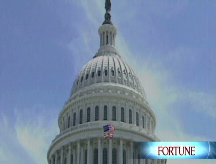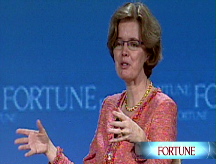Global bazookas, but no silver bullet
The world's central bankers cut rates in a show of force. But even optimists doubt a credit-market thaw is at hand.
 |
| Skeptics say Wednesday's interest rate cut suggests that Ben Bernanke & Co. are getting desperate. |
NEW YORK (Fortune) -- Central bankers unleashed a broadside at the financial markets Wednesday, but it may be months before anyone can tell whether the latest salvo found its mark.
The Federal Reserve and five other central banks cut their interest rates, saying the crisis that has hammered stocks and locked up credit markets has also raised the risk of a serious recession.
The Fed said the move, which reduces its fed funds overnight lending target to 1.5% from 2% previously, is the latest in a series of "unprecedented joint actions" taken along with bankers in Canada, Europe and the United Kingdom in a bid to restore confidence.
So far, though, there's no sign lenders are about to stop hoarding cash and resume making loans.
While stocks were mixed after a five-day wipeout that knocked 13% off blue-chip indexes, the price of gold soared above $900 an ounce and the yield on short-term Treasury securities remained below 1%. The continued rush to safety suggests that after a year of falling interest rates, spectacular bank failures and costly bailouts, even unusual government interventions have lost their shock value.
"I'm skeptical about coordinated rate cuts as anything but a sign of desperation," said University of Oregon economics professor Tim Duy. Duy points to Tuesday's 5% plunge in U.S. stocks, which came even as Fed chief Ben Bernanke hinted that his body was ready to cut again, as evidence that the market lacks confidence "that rate cuts have any effectiveness."
Doubts are also evident on Wall Street. Take Morgan Stanley (MS, Fortune 500). Brad Hintz, a senior analyst at Stanford C. Bernstein, wrote Wednesday in a note to investors that he believes concern about the bank's health is overwrought in light of its substantial capital position and its subsidiaries' access to government funding. Yet Morgan Stanley shares lost a quarter of their value Tuesday even as the company said it received regulatory authority to sell a big stake to Japanese banking giant Mitsubishi UFJ.
"Morgan Stanley's problems are not untreatable - as long as confidence returns to the fixed-income market in time," wrote Hintz, who rates the stock outperform. "And there is the rub - investors have never experienced a credit crisis as deep as long lived as this one."
Don't hold your breath for an end anytime soon. Even the bullish Hintz - who thinks Morgan Stanley shares can triple from a recent $17 or so - doesn't expect to see the credit markets loosening up much between now and year-end.
Hintz says the Wall Street rescue plan signed into law last week as well as other government policies will help. But the thawing of the markets won't start in earnest till next year, he believes, and it's likely that "a full credit market recovery will not be achieved until mid-2009."
That spells more trouble for companies that depend on access to short-term, market-rate financing, from Morgan Stanley and General Electric (GE, Fortune 500) on down. Hintz says that even with the $9 billion Mitsubishi deal on track to close next week, Morgan Stanley still could face a funding squeeze as early as the third quarter of next year, if credit markets don't unlock.
The prospect of a slow, creeping recovery puts added pressure on policymakers. One hopeful sign came from the United Kingdom., where the Treasury arranged to provide as much as 25 billion pounds ($88 billion) to eight big banks in need of capital. Simon Johnson, an economist at MIT who is now a senior fellow at the Peterson Institute in Washington, says this week's annual meetings of the World Bank and International Monetary Fund in Washington offer another opportunity for joint action.
The meetings come as the IMF warned Wednesday that it expects no growth in several big developed economies next year.
"It is too late to avoid a slowdown, but strong and coordinated policies can avoid even worse scenarios," the IMF said in releasing its annual World Economic Outlook report. "In many countries, plans are already being put in place to help resolve the crisis."
But no matter how good those plans are, making them work will take time - which is something policymakers seem to sense they don't have much of right now. ![]()
-
 The retail giant tops the Fortune 500 for the second year in a row. Who else made the list? More
The retail giant tops the Fortune 500 for the second year in a row. Who else made the list? More -
 This group of companies is all about social networking to connect with their customers. More
This group of companies is all about social networking to connect with their customers. More -
 The fight over the cholesterol medication is keeping a generic version from hitting the market. More
The fight over the cholesterol medication is keeping a generic version from hitting the market. More -
 Bin Laden may be dead, but the terrorist group he led doesn't need his money. More
Bin Laden may be dead, but the terrorist group he led doesn't need his money. More -
 U.S. real estate might be a mess, but in other parts of the world, home prices are jumping. More
U.S. real estate might be a mess, but in other parts of the world, home prices are jumping. More -
 Libya's output is a fraction of global production, but it's crucial to the nation's economy. More
Libya's output is a fraction of global production, but it's crucial to the nation's economy. More -
 Once rates start to rise, things could get ugly fast for our neighbors to the north. More
Once rates start to rise, things could get ugly fast for our neighbors to the north. More









